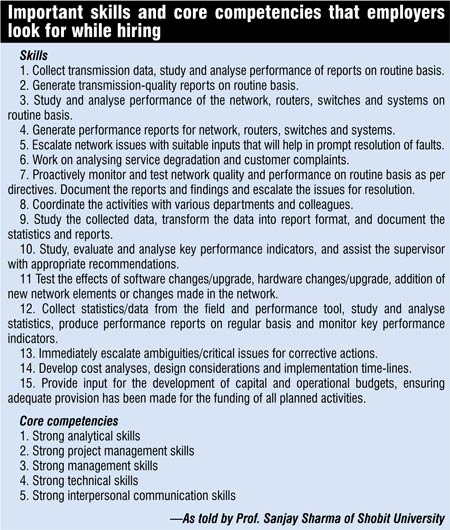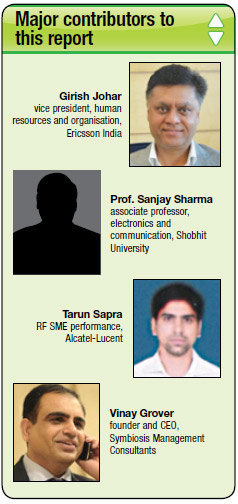There are several new companies which have been given pan-India 2G li-cences to conduct operations across all the sectors. New operators who have been granted licences include MTS, Swan, Uninor, Etisalat and DoCoMo among others. These companies will set up networks and start operations shortly, driving the demand for engineers. Operators like Vodafone, Airtel, Idea and Reliance are laying more emphasis on enhancing their 3G network. They have also started working on long-term evolution (LTE) technology.
How to become a part of the communication chain?
 Talking about the non -engineering positions, academicians, lawyers, MBAs, sales people and PR people are required in the telecom sector just as the techies who design and maintain the worldwide information network for the future. In order to qualify for an engineering job, one needs to be specialised either in electronics and communication engineering, computer science or electrical engineering. The sector also welcomes degree holders, diploma holders or even candidates with part-time certification courses.
Talking about the non -engineering positions, academicians, lawyers, MBAs, sales people and PR people are required in the telecom sector just as the techies who design and maintain the worldwide information network for the future. In order to qualify for an engineering job, one needs to be specialised either in electronics and communication engineering, computer science or electrical engineering. The sector also welcomes degree holders, diploma holders or even candidates with part-time certification courses.
To explain further, let’s segregate the available engineering jobs under some broad categories. For instance, broadband network architects are people who provide IP network architecture solutions to clients for the next-generation network—a network based on IP, ATM and SONET. Wireless engineers develop potential wireless data applications, technology intelligence to identify and track wireless data products, and wireless data strategies. They also interact with vendors.
Another important category is net-work and application test engineers, who integrate, verify and deploy a full-service, high-speed data network providing nationally distributed video, voice, local programming and data services. Also, network management and architecture/system engineers provide network management solutions to clients for currently planned deployments and next-generation network technologies. A position may include focus on all aspects of operations support. A combination of business, telecommunication and computer knowledge is optimal.
Grover informs, “The fresh recruits can look for various disciplines including switch engineer, RF engineer, NOC engineer, OSS/BTS/BSS engineers and others. Middle management professionals can explore career opportunities as network or project managers.
”With the coming of more and more projects, the telecom industry is going for high-scale recruitments. There is a huge demand for software engineers, mobile analysts and hard-ware engineers for mobile handsets. Besides, there are ample opportunities for marketing people, whose services are required to capture more and more customer base. Given the exciting times ahead, the sector is a huge employment generator, likely to generate over 300,000 new jobs over the coming five years,” Sharma opines.
What’s on offer?
There is a huge demand for qualified and skilled professionals with technical knowledge and hands-on experience. Teleocm players are luring the talent with handsome rewards in order to fulfil their rapid growth plans.
According to Sharma, “Suitably skilled candidates can expect a significant premium salary even at the starting level, owing to the challenges the industry is facing in terms of finding and recruiting proper talent. Industry experts believe that the talent crunch in this sector will push salaries even further from the current 15 per cent hike.”
On an average, the sector offers freshers a starting salary of Rs 300,000 to Rs 500,000 per annum. Customer-facing jobs fetch something between Rs 200,000 and Rs 300,000 per annum. Experienced professionals can expect Rs 600,000 to 1,200,000 per annum.
Sapra opines, “There will be a lot of movement within the industry, with new companies willing to establish credibility in the market in the short-est possible time. Companies are even spending extra bucks to tap quality and experienced professionals. So for a professional of, say, five years experience, there is virtually no limit to the potential earnings. A package in the range of Rs 1,000,000 to 1,200,000 is along the expected lines. The industry is offering freshers competitive pay packages despite having to spend time and resources in training the manpower before they turn productive.”
The year-to-year salary hike is quite satisfactory in comparison with other sectors. As an engineer, you could choose to continue in the technology field, be a part of the techno
commercial team or move to the busi-ness development aspect of the service. Under the technical path, you can start off as a software engineer and grow to the highest level of a chief technical officer. If you choose the managerial path, you can grow to the level of a business line head.
What’s in demand?
Let’s talk about the sector expectations now. Though the Indian engineering institutes are churning out thousands of technical graduates every year, only 25 to 30 per cent are employable. There is a significant gap between the need of the sector and what the fresh engineering graduates bring to the table. Recruiters generally look at a combination of a consistent academic record and soft skills.
churning out thousands of technical graduates every year, only 25 to 30 per cent are employable. There is a significant gap between the need of the sector and what the fresh engineering graduates bring to the table. Recruiters generally look at a combination of a consistent academic record and soft skills.
“When it comes to hiring an engineer, a company looks for a candidate who possesses an engineering degree, preferably a specialisation in electronics and communication from a reputed college. Also, if a candidate possesses work experience with a telecom operator, or active or passive telecom infrastructure company, it adds to his credentials,” Grover mentions.
Johar adds, “As an organisation, we focus to get right fit for the job. We capture the competencies required to perform in a given role, which include not only technical competencies but also business as well as human competencies. We hire engineers who are specialised in electronics and communication, or telecom, and also extend the scope to IT and computer science graduates.”
Ericsson hires graduates for all domains like manufacturing and man-aged services, remote infrastructure management, R&D and network operations centre. The company also provides engineering students with internships in various departments under different project mentors across different domains. This helps the students get an exposure and also have hands-on-work-experience with Ericsson.
“The internship not only provides them with the basic training on various telecom architectures but also brings forth the real working scenario of the telecommunication field,” Johar informs.
Handy tips
It is important to be a part of any live project that follows the recent sector trend, rather than confining yourself to the textbooks. You should start from the base level as an aspiring professional. Even professionals with engineering background often go through specialised training in theory and practice for optimising telecom applications. The training enables them to properly handle different types of machines and instruments used in various systems of telecom equipment, both in wired and wireless communication.
As telecom networks traverse multiple cultures, diverse terrains and extreme climates, the sector opens up a plethora of exciting work opportunities for aspirants.
The author is from EFY Bureau, New Delhi






